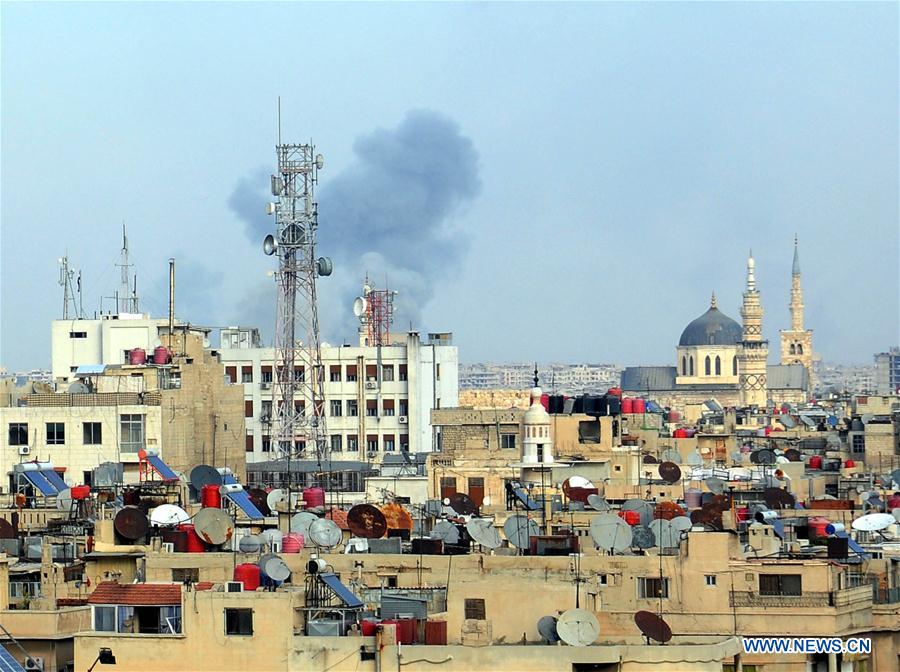
Smoke is seen in some areas in Damascus, capital of Syria, on Feb.20, 2018. Tens of people have been taken to the hospitals Tuesday due to the intensified rebels' mortar attack that targeted several parts of Damascus as part of an onging military showdown between the rebels and the government forces. (Xinhua/Ammar Safarjalani)
DAMASCUS, Feb. 21 (Xinhua) -- The rebel-held Eastern Ghouta in the countryside of Syrian capital Damascus has witnessed intense airstrikes and shelling as military showdown is approaching.
The spark of the recent unprecedented violence was ignited a couple of months ago when al-Qaida-linked groups launched an offensive against a key military base in the city of Harasta in the rebel-held Eastern Ghouta countryside of Damascus, prompting a counter military offensive in that area.
The attacks at the times were coupled with rebels shelling of the capital Damascus, and Syrian airstrikes targeting the rebel positions in Eastern Ghouta.
But the situation has dramatically worsened in recent days when a wide-scale military offensive on Eastern Ghouta was in place, preparing to end the presence of al-Qaida-linked groups in that area.
The rebels' mortar shells have rained down Damascus so heavily that life has been largely paralyzed in the Damascus' eastern neighborhoods near Eastern Ghouta. People cower at home, fearing they could end up dead outside from one of the blind mortars.
The hospitals in Damascus, mainly those close to the east, have been jam-packed with wounded people and children. Moreover, residents in eastern Damascus have refrained from sending their kids to the schools, as three children were killed on Tuesday when a mortar shell struck their school in central Damascus.
The eastern neighborhoods of Damascus, including in the old city that had just regained some of its lost glamour and life, are now eerily empty while ambulances' sirens are wailing in the surroundings.
Late last Sunday, the Syrian army amassed forces at the outskirts of Eastern Ghouta and started heavily shelling the rebel positions in Eastern Ghouta with artillery and airstrikes that could be clearly heard across the capital.
But the situation is not easy, as around 350,000 civilians are still living in Eastern Ghouta, which is a large countryside constituting of several towns and villages under the rebel control.
Eastern Ghouta has for long been the major threat to the capital Damascus, with rebels, including al-Qaida-linked ones, launching several attacks to infiltrate the capital.
Four key rebel groups are positioned inside Eastern Ghouta such as the Islam Army, Failaq al-Rahman, Ahrar al-Sham and the Levant Liberation Committee (LLC), otherwise known as the al-Qaida-linked Nusra Front.
Apparently, the decision has been made to decisively eliminate the threat on the eastern rim of Damascus.
The mortar attacks on the capital and the airstrikes against the rebel-held areas in Eastern Ghouta have largely increased since Sunday.
Syrian TVs have aired several interviews with people on the streets in Damascus, most of whom have supported a massive military offensive on Eastern Ghouta to rid the city of the threat of the mortar attacks that are rattling the daily life in Damascus.
On the other hand, the opposition activists are reporting "catastrophic" situation in eastern Ghouta, claiming that hundreds of people have been killed or wounded in the recent days.
The Syrian Observatory for Human Rights said as many as 3,000 airstrikes and artillery shelling targeted Eastern Ghouta over the past four days.
The UK-based watchdog group said a total of 310 people have been killed and over 1,550 others wounded by the shelling on Eastern Ghouta over the past few days.
The oppositional monitor said six medical centers and hospitals have gone out of service as a result.
Also, the International Committee of the Red Cross (ICRC) has called for restraint and access to the wounded after "the deadly escalation of fighting that has hit Damascus in recent days."
"The fighting appears likely to cause much more suffering in the days and weeks ahead, and our teams need to be allowed to enter Eastern Ghouta to aid the wounded," said Marianne Gasser, ICRC's head of delegation in Syria, in a statement released on Wednesday.
The statement said the medical personnel in Eastern Ghouta can't cope with the high number of injuries, adding that the area does not have enough medicines and supplies, especially after medical facilities were reported to have been hit.
"Wounded victims are dying only because they cannot be treated in time. In some areas of Ghouta, entire families have no safe place to go," Gasser said, adding that "on the other side of the frontline, people in Damascus are in constant fear that their children will be hit by falling mortars. This is madness and it has to stop. Civilians must not be targeted."
For his side, Antonio Guterres, the United Nations secretary general, on Wednesday called for an immediate halt in fighting in Eastern Ghouta where he said the life for civilians has turned into "hell on earth."
Addressing the UN Security Council, Guterres said: "My appeal to all those involved is for an immediate suspension of all war activities in Eastern Ghouta allowing for humanitarian aid to reach all those in need."















